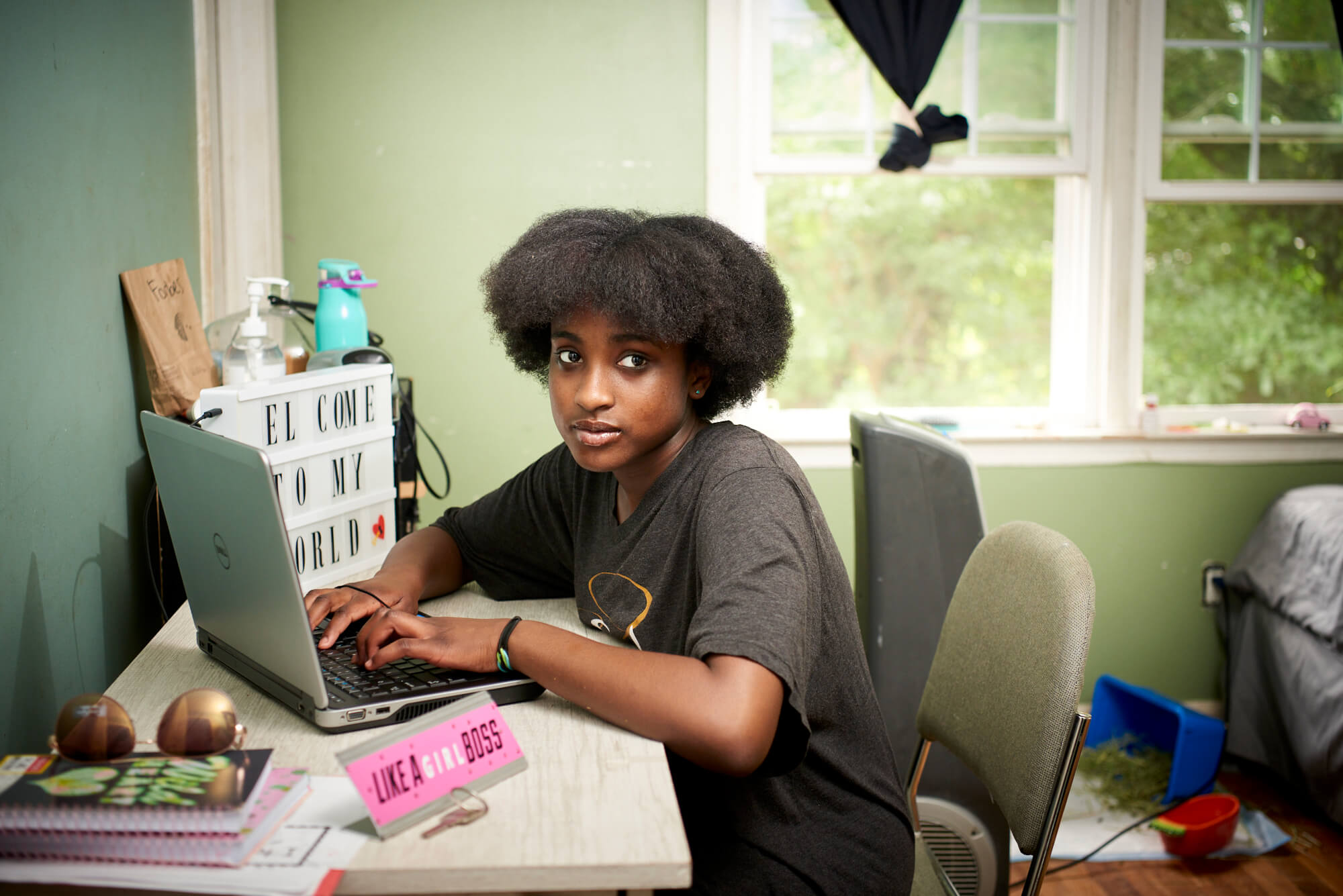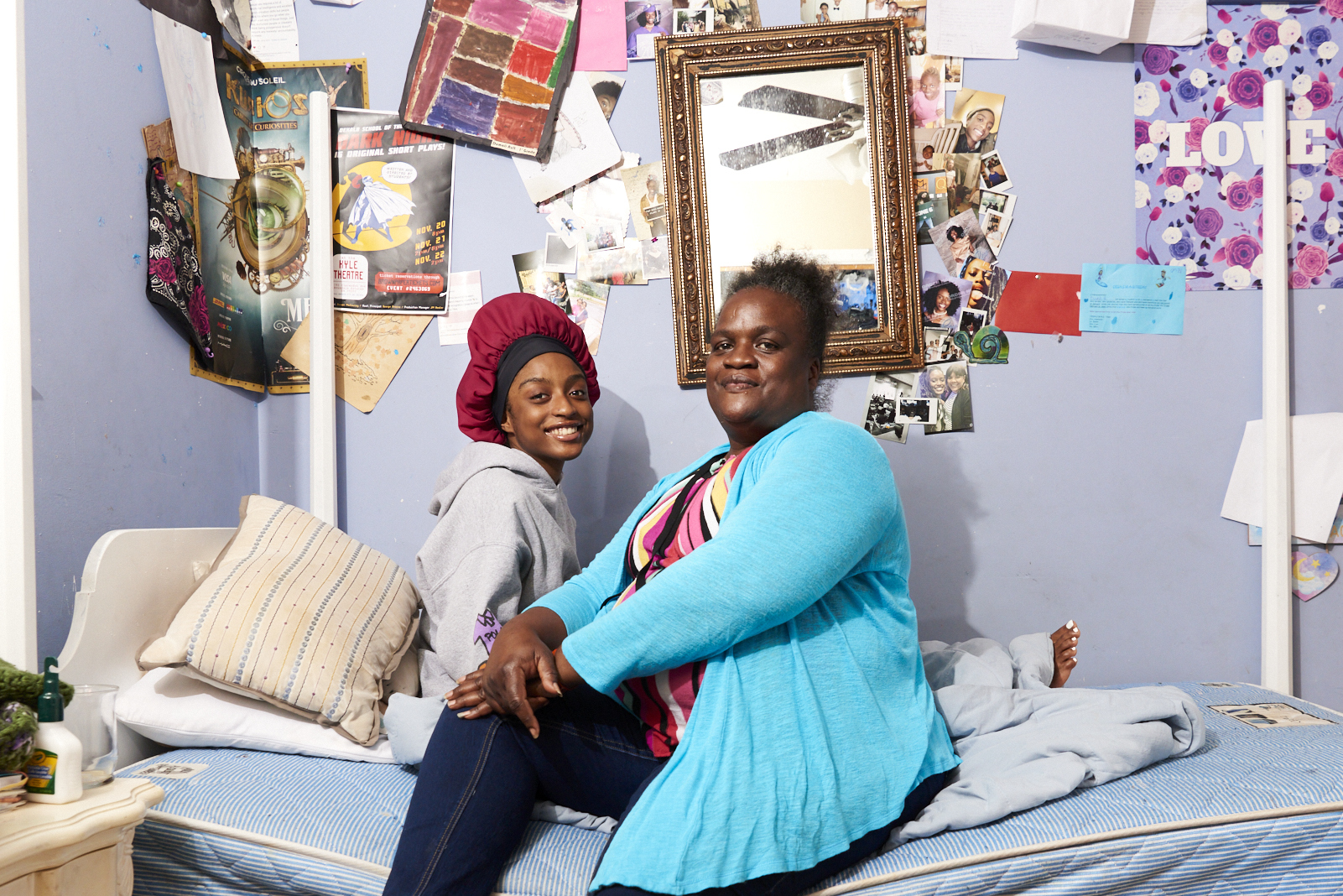A total nightmare. That’s what life has felt like as a mother living with six children in virtual classes. For over a year, it’s been one challenge after another to get the tools my children need to continue their education. We needed space, so I got them folding tables for desks. We needed computers, so a local nonprofit helped supply each child with a laptop. But we learned quickly that all the space and supplies in the world didn’t mean much without a steady broadband internet connection. We could not afford it.
This past year has been an emotional roller coaster for me, and an academic nightmare for my children.
When classes went virtual last year, I had recently lost my position as a school bus driver. Six of my children lived at home with me during this time. I share custody with my ex-husband, but for much of the past year, I’ve been on my own. At one point, I had the children for 124 days straight.
Each week, it was chaos Monday through Friday, with all the children logged into virtual classrooms at the same time, using a hotspot they shared because we didn’t have reliable broadband internet access. With so many children using the hotspot at once, they were constantly getting booted off. I would let them use my phone instead, but then I needed it for work. Then the electricity would go out. This past year has been an emotional roller coaster for me, and an academic nightmare for my children.

A local nonprofit, InspiredU, supplied Kim’s children with laptops.
Eley
My children were penalized for challenges connecting to online classes that were beyond their control, and it felt like it was too much to handle. At one point my son said, “Mom, I’m going to drop out and get my GED. I can’t function like this.” My children experienced significant learning loss, their grades suffered, and they were often marked absent. A few of them battled intensified social anxiety and depression. Some of the teachers could not or did not have the capacity to empathize with the challenges my family faced without reliable broadband access.
When a bunch of children need to use the internet at the same time, for hours and hours, one hotspot won’t cut it.
Thank God, my son stayed in school and graduated this year. But I often wonder how many other children there are out there who had to drop out or give up on their dreams simply because they didn’t have broadband access. I know that many young adults were forced to leave school during the pandemic to help their families. Other families in my community who were in similarly challenging situations came to me to find answers and support. I myself had felt lost in the process as I fought to figure it all out, and my neighbors had questions for me that I was still working towards figuring out.
We were able to pull through thanks to the help of the school’s Department Parent and Family Engagement and local groups like InspiredU, which supplies students with laptops and provides one hotspot per household. But that was not enough. Computers would break down and I wouldn’t know how to fix them. When a bunch of children need to use the internet at the same time, for hours and hours, one hotspot won’t cut it. And what would my children do when they go to their dad’s house, where there’s no broadband, and not even a hotspot? I appealed to the school district, and had to advocate with them to get a second hotspot.
Getting connected was one thing. Finding space was another challenge. At the start of the pandemic, the school district told parents to create a workspace, create some structure. So I bought several desk tops and placed them on top of little folding coffee tables for each of the children, and set them up in our dining room. But that was a disaster. Each child had a different teacher, and they were all talking at the same time. Everybody could hear everything. It was too distracting to get much learning done. I tried to enforce some structure, but I’m one parent. When my children were with their dad, they didn’t have broadband or supervision, since he works outside the home. Any structure I was able to initiate for their remote learning amid my own broadband difficulties would unravel when they spent time at his house. The limited access to broadband at their dad’s house only increased the academic challenges they were facing.

Eley
As a mom, my number one priority is managing my children’s academic and social affairs and ensuring their physical and emotional well-being. And I needed help. I experienced cognitive dissonance at times as I persistently tried to navigate systems that were very unfamiliar to not only to me, but also to my former husband, who is an immigrant, and many of the teachers. The support the school provided could have been adequate, but it was near impossible to access. They set up a fancy app, but it was hard to use. When I would call the school, nobody would pick up the phone. I had to press through on my own, until I could finally connect with people and organizations who could help, while dealing with all the stress of the public health and economic crises. We were one tent short of a circus.
My heart breaks for all the students who are suffering punishment for circumstances outside their control, like living in a household where their parents are forced to choose which basic necessities to pay for.
My aunt, who lives with us, ended up stepping in to pay for a more stable broadband subscription. She is on a fixed income, and the $60 she pays each month for service is a huge financial challenge. So many families across the country have similar types of stories. I have witnessed how much more difficult this is for parents who face literacy challenges or whose second language is English. My heart breaks for all the students who are suffering punishment for circumstances outside their control, like living in a household where their parents are forced to choose which basic necessities to pay for.

Eley
The need for broadband internet isn’t new, and it isn’t going to go away once the pandemic ends. At this point, broadband is an essential utility like water or electricity: We need it to live as equitable members of society with equal access to not only education, but jobs, health care, and almost every aspect of today’s world. To me, having accessible, affordable, and reliable broadband means that our advocacy is effective and ongoing and someone is listening. It would mean victory to me and all the other parents and children that have been relentlessly navigating and persevering to get through each day during this painful past year.

